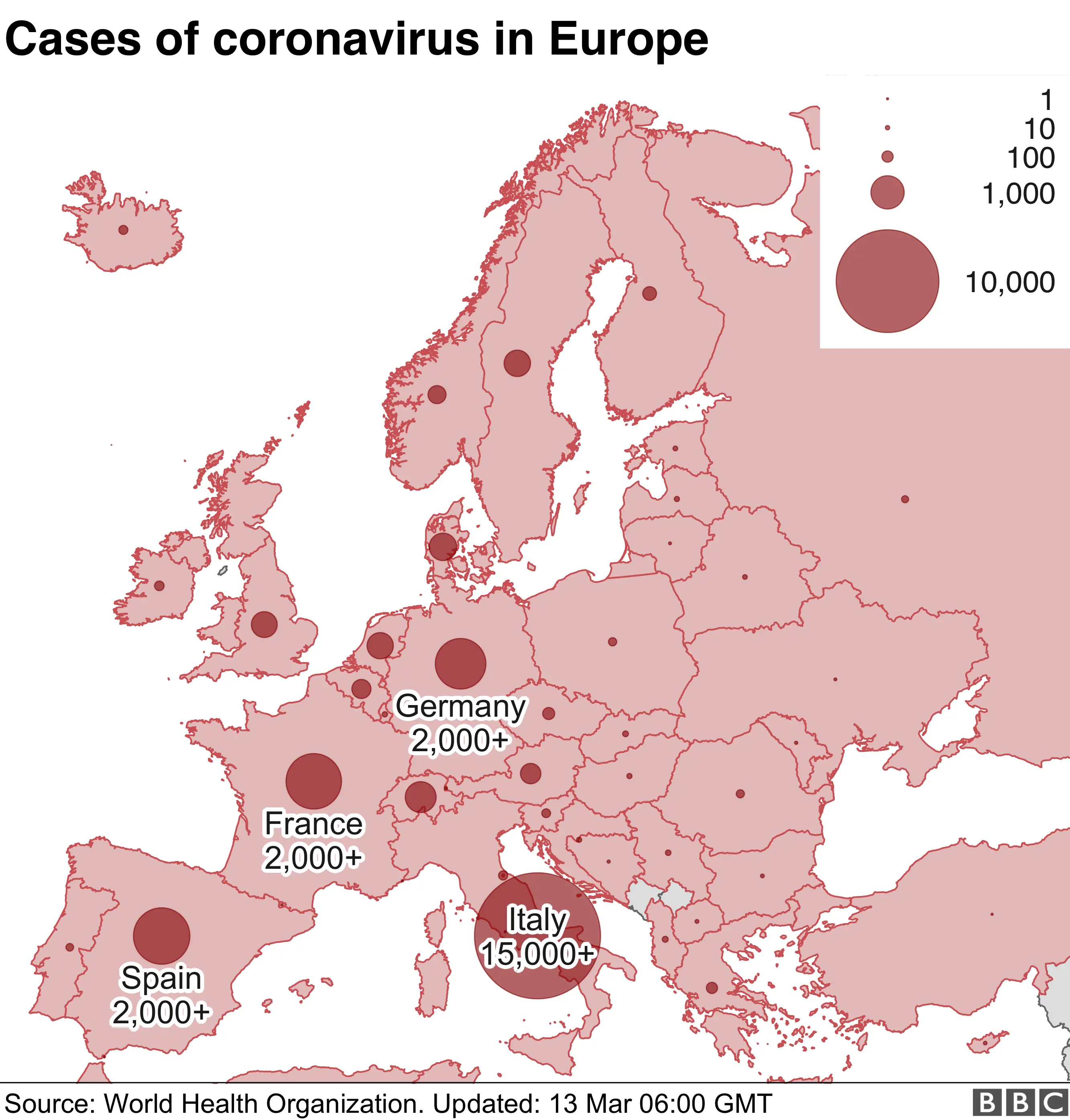Coronavirus: Europe now epicentre of the pandemic, says WHO
Europe is now the "epicentre" of the global coronavirus pandemic, the head of the World Health Organization says.
Dr Tedros Adhanom Ghebreyesus urged countries to use aggressive measures, community mobilisation and social distancing to save lives.
"Do not just let this fire burn," he said.
His comments came as several European countries reported steep rises in infections and deaths. Italy has recorded its highest daily toll yet.
There were 250 deaths recorded over the past 24 hours, taking the total to 1,266, with 17,660 infections overall.
Spain, the worst-affected European country after Italy, reported a 50% jump in fatalities to 120 on Friday. Infections increased to 4,231.
Prime Minister Pedro Sanchez says a state of alert will come into effect there on Saturday for two weeks.


- LIVE UPDATES: Borders shut as coronavirus cases rise
- EASY STEPS: How to keep safe
- A SIMPLE GUIDE: What are the symptoms?
- GETTING READY: How prepared is the UK?
- TRAVEL PLANS: What are your rights?

Controls are also being introduced at an increasing number of borders in Europe, in response to rapid spread of the virus.
Why is Europe the 'epicentre'?
More than 132,500 people have been diagnosed with Covid-19 in 123 countries around the world, according to the WHO.
The total number of deaths has reached about 5,000 - a figure Dr Tedros described as "a tragic milestone".
"Europe has now become the epicentre of the pandemic, with more reported cases and deaths than the rest of the world combined, apart from China," he said.
"More cases are now being reported every day than were reported in China at the height of its epidemic."
As well as the increases in Spain and Italy, France has now confirmed 2,876 cases and 79 deaths, up from a total of 61 deaths on Thursday.
Germany has seen 3,062 cases and five deaths. There have been 798 confirmed infections in the UK and 11 deaths.


What are European countries doing about it?
Announcing the state of alert in Spain, Mr Sanchez said the government would "mobilise all the resources of state to better protect the health of all of its citizens".
It will be able to limit movement, order evacuations, prohibit access to certain places and intervene in industry for up to 15 days.
"Victory depends on every single one of us," Mr Sanchez said. "Heroism is also about washing your hands and staying at home."
All but "essential travel" to parts of Spain should be avoided, says the UK Foreign and Commonwealth Office.
Italy has imposed a nationwide lockdown.
Meanwhile, at least 10 other countries in Europe are enforcing border closures, including:
- Denmark: Closes borders to foreign visitors from Saturday
- Czech Republic: Bans all foreigners from entering the country, except those with residence permits. Bans most of its own nationals from leaving
- Slovakia: Closes borders to all foreigners except those with a residence permit.
- Austria: Closes three land border crossings with Italy to all foreigners, except those with a medical certificate issued within four days. No restriction on Austrian nationals
- Ukraine: Closes border crossings to foreigners (except diplomats) for two weeks
- Hungary: Closes land borders with Austria and Slovenia
- Poland: From Sunday will close borders to foreign visitors
Belgium, France, Switzerland and parts of Germany are among the latest countries to close schools.
There are also widespread curbs on large gatherings and measures to close theatres, restaurants and bars.
Germany's Bundesliga, the only one of the big five European football leagues still being played, is to suspend games in the top two divisions from Tuesday.
Paris's Louvre - the largest art museum in the world - announced it would close from Friday, as will the Eiffel Tower.

Why Europe could be worse off than China

The number of cases of coronavirus reported every day in Europe has surpassed China at its peak.
But Europe is in a worse position.
The overwhelming majority of China's cases were in one place, Hubei province and those were largely concentrated in one city, Wuhan.
It was dealt with by an authoritarian government that imposed the biggest quarantine in human history.
While there are hotspots in Europe, this is an outbreak across a continent and different countries are adopting very different strategies for dealing with coronavirus.
All these figures are based on cases that have been detected, but scientists fear there could be large outbreaks going on unnoticed in countries that don't have the tools to spot them.

What are the developments elsewhere?
US President Donald Trump has declared a national emergency, which allows the federal government to access up to $50bn (£40bn) in funds.
As the president spoke, the three main US indexes jumped more than 9%.
Later on Friday, President Trump said he did not need to self-isolate, despite meeting at least one person who had the coronavirus.
His travel ban on 26 European countries, which was met with anger and confusion this week, will go into effect at midnight EDT (0400 GMT).
Pakistan is shutting all of its land borders and limiting international flights for 15 days, its foreign minister says.
In Canada, MPs have voted to suspend parliament and health officials have advised against non-essential foreign travel.
Prime Minister Justin Trudeau began a 14-day self-isolation period on Friday after his wife tested positive.
Also on Friday, Australia's Home Affairs Minister Peter Dutton was admitted to hospital after testing positive. He recently travelled to Washington and met President Trump's daughter, Ivanka
Meanwhile, Iran announced another 85 deaths, the country's highest toll in a 24-hour period, bringing the number of dead there to 514. The true figure is feared to be much higher.
The first cases were recorded in East Africa, in Kenya, Ethiopia and Sudan, which has had the region's first death.
